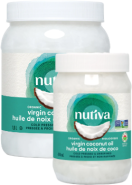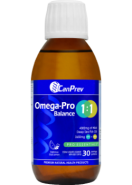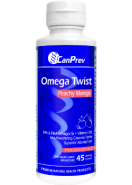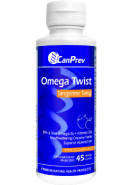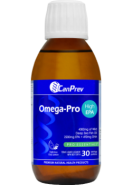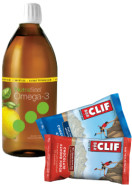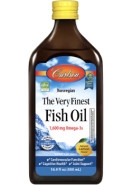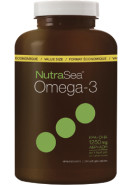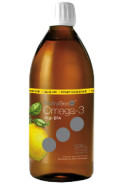Belly To Baby Prenatal Omega - 3 Dha (Lemon) - 60 Softgels - Sealicious
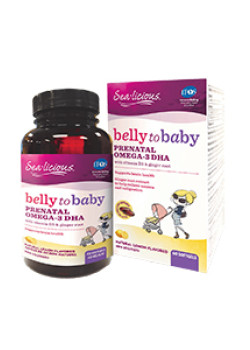
We're sorry, we no longer carry this item.
Check These out
Suggested, Similar, & Related Products:
Or, Shop our Latest Deals:
Shop Now >- 1520mg
- Fish oil (sardine/anchovy)
- 1200mg
- Omega-3
- 136mg
- Eicosapentaenoic Acid (EPA)
- 700mg
- Docosahexaenoic Acid (DHA)
- 500IU
- Vitamin D3
- 100mg
- Ginger root extract
Format
 Softgels
Softgels
60
Dosage
Take 2 softgels daily. Post natal, lactation and therapeutic use: Take 4 softgels daily
Important Information
Consult a health care practitioner is symptoms persist or worsen. Free of mercury
- Added ginger to help prevent nausea, upset stomach and indigestion
- Gentle on stomach
- Enhanced potency and purity
- Supports babies developing eyes, brain, bones and immune system
- Improves nutrition of breast milk supply
- Helps support moms mood and mental focus
Related Videos
No Related VideosArticles by a naturopathic doctor.
Karlene's Sea-Licious Omega Oils are not only naturally cleaner, but they also have the highest natural ratio of omega-3s, EPA and DHA. Sea-licious is a BC-based, family-owned company that is proud to be a 5-Star IFOS-certified omega-3 fish oil. Sea-licious Fish Oils are tested for dioxins, PCBs and heavy metals.
OMEGA-3 EPA/DHA
Omega 3 essential fatty acids are often deficient in our diets, but are essential to our wellbeing...
Essential fatty acids are called "essential" because they cannot be biosynthesized in sufficient amounts by the human body and have to be taken in through dietary sources to allow normal metabolism. The omega 3 fatty acids that humans require are: eicosapentaenoic acid (EPA), docosahexaenoic acid (DHA), and alpha-linolenic acid (ALA). The health benefits of Omega 3 fatty acids, EPA and DHA in particular, have been widely studied and are both numerous and widespread.
Vegetarian/Vegan Sources of Omega 3's
Both flax and hemp seed oils are the highest vegetable sources of omega 3, although most of this is ALA. In the human body, under optimal conditions, we can convert a certain amount of ALA to DHA and EPA. However, it is not always the case that we have excess ALA to convert, and it has been shown that our conversion process is very inefficient, converting anywhere from only 5% - 20% of what is needed. Women are said to be slightly more efficient at this conversion process than men. For vegans, this can make it virtually impossible to get adequate amounts of DHA and EPA. Fish and fish oils are by far the easiest and highest source of these essential fats. That being said, some supplement companies have released an algae based DHA source. Research is also looking into sachi inchi, a plant native to the Amazon rainforest, high in omega 3 fatty acids. These supplements may help to span the gap, and provide vegetarians effective alternative sources. Just be sure to take note of the dose of EPA and DHA of your supplement. See the dosage information below for more information.
Fish Oil
Interestingly, the research studies performed on the benefits of fish oil are almost exclusively performed on fish oil supplementation and diets with high fish content. Fish and fish oils are probably the greatest source of EPA and DHA omega 3, long chain polyunsaturated fatty acids. The mental health benefits of omega 3 oils are particularly attributed to fish oil supplementation.
Krill Oil
One great source of omega 3 fatty acids that is also very environmentally sustainable, is krill oil. Because krill are so low on the food chain, their oil also does not contain many of the contaminants present in fish. Krill oil also contains phospholipids, and astaxanthin, which have additional health benefits.
Heart Health and Weight Management
The research on omega 3 fatty acids and heart health is extensive. Omega 3 fatty acids have been shown to lower cholesterol, triglycerides and high blood pressure. DHA has been shown to be especially beneficial to heart health. A number of studies have shown that omega 3 oils, DHA and EPA in particular, help to protect against obesity. These oils help reduce body fat, supporting a healthier BMI and hip to waist circumference ratio, one of the key predictors of metabolic syndrome. Thus, omega 3 oils are useful in terms of treating and preventing heart disease and metabolic syndrome.
Pregnancy and Infants
Omega 3 fatty acids, DHA in particular, has been associated with the development of the brain, eyes, and immune system of a growing fetus, as well as decreased risk of low birth weight infants. Supplementation is highly recommended for both maternal and fetal health during pregnancy.
Brain Health
The brain requires the largest amounts of omega 3 fatty acids of the whole body. In fact, the brain is nearly 60% fat by weight, and a large percentage of this is DHA. Omega 3 fatty acids have also been shown to have an affinity for the central nervous system, helping to treat and prevent cognitive decline, protect memory, treat depression, bipolar disorder, attention deficit disorders and schizophrenia. DHA has been associated with improved brain function, while EPA is associated with mood balancing.
Immune Regulation and Cell Growths
These oils are also an effective treatment for a variety of autoimmune conditions, including SLE (lupus), IBD (irritable bowel disease) and rheumatoid arthritis (RA). Studies have also backed its use in osteoporosis, asthma, psoriasis, eczema, and other dermatological disorders, macular degeneration, PMS and prostate and colon cell growths.
Skin Health
Fatty acids are used in every cell in our bodies to make up their cell membranes. Taking in sufficient healthy fats can help the body to create new healthy cells to replace the old. This is especially the case with our skin cells, where new cell growth and proper cell moisture content make huge differences in the appearance and feel of our skin. Getting sufficient omega 3 fats can help to keep skin supple and smooth, and the immune regulatory functions of EPA and DHA can help to reduce inflammatory conditions like eczema, psoriasis and acne.
Contaminants
There are also legitimate concerns with the over consumption of fish, especially during pregnancy, in terms of high levels of contaminants. In pregnancy, methyl-mercury, which can cross the placenta has been shown to impair development of the central nervous system in the fetus. Fish often contains contaminants such as: polychlorinated bi-phenyls (PCBs) and methyl-mercury, which have a number of negative effects on health. That being said, reviews dedicated to health risk-benefit analysis of fish intake do state that the benefits of fish consumption often outweigh the risks. The exception to this rule seems to be the consumption of fish in pregnancy, although extremely beneficial, these women do need to be careful to limit their intake (6 oz./wk is the current recommendation) while pregnant.
Why can't I just eat fish and omega 3 "enriched" foods?
Many of us would much rather obtain as many nutrients as possible through food, as opposed to taking a number of supplements. This actually tends to be the aim of most naturopaths, with a few exceptions. Omega 3 is often one of those exceptions. As was previously mentioned, vegetarian sources are often insufficient for full health benefits. Fish can also be contaminated with a number of different harmful chemicals, limiting the amount we can safely eat. On the other hand, many foods are "enriched" with omega 3, such as eggs, bread, and milk. It is important to look at the doses that these foods contain, as they are often miniscule when compared with the dose required for health benefits. High quality fish oil supplements significantly reduce the levels of the contaminants currently found in fish, and are a healthier solution for most people that can provide the levels of EPA and DHA required to have health benefits. See below for more information.
How can I get more omega 3's?
Dosage recommendations for omega 3 fatty acids vary depending on the disease process or overall goal. If your goal is to lower your triglyceride level, for instance, it is recommended that you consume 3-4 g/day, whereas studies aimed at treating depression found that only 1 g of EPA/day showed better results than higher dosages of 2 and 3 grams. It is important to know that whatever dose you are recommended, you need to be sure your supplement contains the right stuff. On the bottle you will see the total omega content, as well as the specific contents of DHA, EPA, etc. If you have been advised to take 2 g of EPA + DHA/day, make sure you are looking at the breakdown and that you are following these numbers, rather than looking at the total omega count.
OMEGA-3 EPA/DHA – QUICK FACTS
FOOD SOURCE
· Fish, flax seed, hemp.
DEFICIENCY SYMPTOMS
· Eczema, dry skin, PMS, asthma, high cholesterol, obesity, depression, cardiovascular disease, autoimmune conditions, etc.
OPTIMUM DOSAGE
· Anywhere from 1 g – 6 g/day. (Clinical doses may be differ, as recommended by your healthcare practitioner).
WORKS WELL WITH
· Other essential fatty acids, fat soluble vitamins D, E, A and K.
IMPORTANT INFORMATION
· Use caution supplementing omega 3 oils if you are on blood thinning medication, as fish oil can increase these effects.
· Research shows that fish oil may cause increases in fasting blood glucose. These levels should be monitored if using an omega 3 supplement.
- Reviews
- POST A NEW REVIEW
















